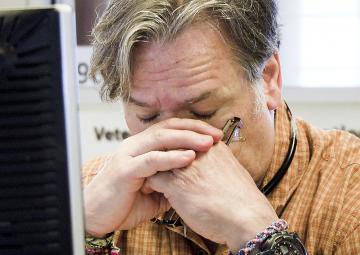Oscar-nominated short documentaries outstanding and heavy
By Barry Paris / Pittsburgh Post-Gazette
Heavy, heavier, heaviest — plus mega-heavy — would characterize this year’s Oscar-nominated short documentary films, whose subjects include dying mothers, gravely ill babies, suicide and animal slaughter. The quality is exceptionally high, although watching them all together is an emotional challenge.
Don’t run screaming in the opposite direction. Judge for yourself — at the Pittsburgh Filmmakers Melwood screening room this weekend — before the Oscar judges’ verdict is handed down on Feb. 22. Bring a supply of Kleenex.
"Crisis Hotline: Veterans Press 1” (director Ellen Goosenberg Kent, USA, 39 min.): American combat veterans commit suicide at a rate of one an hour, and there’s a total of one hotline crisis center — at the VA Hospital in Canandaigua, N.Y. — exclusively dedicated to helping them. We watch the brilliant responders there, racing against time as they handle harrowing calls from vets in PTSD despair, talking them down from the torturous flashbacks and plans “to bleed out,” reminding them that the horrors they saw in Iraq and Afghanistan weren’t their fault. An hour on one call ends in a sudden hang-up. Will EMS get there in time? They can’t go in until the police arrive first. It is more viscerally suspenseful than any slick TV drama: “What’s that clicking, Michael? Is that a gun in your hand? Can you put it down while we talk?” Life-or-death words at two ends of a phone line. This powerful piece is my choice for the Oscar.
“Our Curse” (Tomasz Sliwinski, Poland, 27 min.): Director Sliwinski’s and wife Magda’s newborn son Leo suffers from “Ondine’s Curse,” aka Congenital Central Hypoventilation Syndrome, a rare and incurable disorder that stops him from breathing when he falls asleep. He must be attached to a noisy machine connected to a hole in his throat — gasping through the ventilator — any and every time he sleeps, while his brutally honest parents grapple with their fears about how long he will live (or want to live) and their own dreaded roles as lifelong caregivers. The horror of swabbing little Leo’s tracheotomy as he starts to suffocate, before reinserting his tube, is almost impossible to watch. “Don’t fall asleep!” says his mother softly, while breastfeeding him. But there is, finally, a beautiful smile, a grasping of a leaf and a lot of hope.
“Joanna” (Aneta Kopacz, Poland, 40 min.): A second somber Polish entry this year is the profile of an extraordinary young mother, terminally ill with cancer, who is determined to prepare her son Jan for her passing and leave him with all the life-affirming experiences and wisdom she can muster. They play and banter incessantly. They explore nature, touch woodchips, dip their fingers in a babbling brook, stop to inspect an anthill. Joanna creates a “scroll” of life questions — some answered, most not — for her precocious little boy: What are you scared of? What do you like most? He and her sweet, silent husband Piotr shave their heads in solidarity with her. Now and then her heroic strength falters. “I’ll hold an audition for your next wife on my blog,” she tells Piotr, with tearful gallows humor. The love and melancholy are overwhelming: “I’m not afraid to die,” she says, “I’m afraid to leave you by yourselves.”
“The Reaper” (Gabriel Serra Arguello, Mexico, 29 min.): In his 25 years of working in a slaughterhouse, Efrain Garcia has killed more thousands of animals than he could ever count. The impact of those years on his psyche and soul seem reflected, somehow, by the fear and misery in the animals’ eyes. The images of slaughter are not graphic but suggestive: A patina of red splatter — tiny dots of blood — cover boots, clothes, arms, walls, tools, ceilings, floors — like a gruesome pointillist painting. Efrain has nightmares about the cattle taking revenge (“It’s your turn now...”). Exquisitely filmed and extremely disturbing, it puts Vonnegut’s “Slaughterhouse 5” to shame. “I’m scared of death,” says Efrain, who doles it out 500 times a day. “When you kill a bull, tears roll from its eyes.” It’s enough to make you a vegan.
“White Earth” (J. Christan Jensen, USA, 20 min.): This one is no laugh riot but feels downright frothy compared with the others. It features the kids in a tiny town of oil workers in North Dakota, largely left to their own devices in trailers and shacks during the long hours their parents work away from home. “I don’t go to school, I just sit home and try to find something to do,” says one boy, glancing at the flat, near-Arctic cold landscape, where oil rigs churn and methane flames shoot 30 feet high from the ground. “The first natural gas came from a pig’s butt!” he correctly informs, as endless tanker trains pass by and a constant stream of new people — legal and illegal — come through in search of work. It has a nice western-moody quality, even if it never quite coalesces.
Oscar-nominated documentary shorts run Friday through Sunday at Melwood Screening Room, Oakland, through Feb. 15. Oscar-nominated Animated & Live Action shorts continue at the Regent Square.
Post-Gazette film critic emeritus Barry Paris: parispg48@aol.com.





